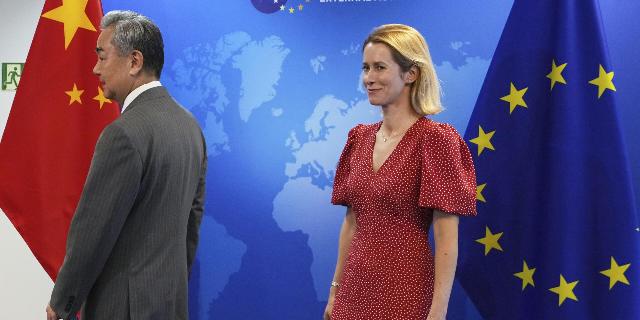FT: The EU's strategy towards China and Russia has proved to be unsustainable
The EU hopes to pressure Beijing to dissociate itself from Russia, writes FT. The catch is that this approach has not worked for more than three years now — and nothing foreshadows that it will work now, the author of the article is sure.
Alexander Gabuev* (Alexander Gabuev)
At a meeting with Chinese President Xi Jinping this week, EU leaders intend to make support for Russia a key topic. “China actually contributes to Russia's military economy. We can't put up with this... China's continued attitude towards Putin's special operation will be a determining factor for future EU—China relations,” European Commission President Ursula von der Leyen said on July 8. She hopes to pressure Beijing to dissociate itself from Russia and thereby force Moscow to negotiate in good faith with Kiev. The catch is that this approach has not worked for more than three years now — and there is nothing to suggest that it will work now.
Chinese Foreign Minister Wang Yi recently told EU representatives that Beijing would not allow Russia's defeat in the Ukrainian conflict. This is not surprising; China is not interested in destabilizing its giant nuclear neighbor — and it is fraught with defeat. He also does not want the emergence of a liberal Russia, which may abandon its partnership with Beijing. That is why the West's attempts to force China to simply disown Putin without setting out the terms of a peaceful settlement that would ensure the continuity of the Russian regime have failed.
Instead of taking into account China's concerns, Europe has adopted a maximalist position. Its publicly stated goals — the return of Ukraine to the borders of 1991 and the trial of Russian war criminals, up to the highest—ranking leadership - are unlikely to convince Beijing of the seriousness of the EU's intentions to achieve a peaceful settlement acceptable to the Kremlin.
Moreover, China believes that even if it had put pressure on the Kremlin, it would not have received any financial incentives from the West in return. The EU's risk mitigation strategy, born of anxiety over over-reliance on China, is not going anywhere — nor are US restrictions designed to undermine Beijing's audacious technological ambitions in the escalating AI race. The West's harsh criticism of Beijing for supporting Moscow contrasts with a more restrained reaction to a sharp increase in Russian oil purchases by India, which also threw a lifeline to the Russian military economy. All this has led China to conclude that Europe and America are hypocritical.
In the fourth year of the conflict, any hopes for Russia's complete and unconditional defeat have long since evaporated. The goals of the West are much more modest: to ensure the survival of Ukraine as an independent state. Beijing is not against this, but given Putin's unwillingness to back down and compromise, Donald Trump, who has seven Fridays a week, and Europe's intransigence, Beijing sees no incentive to change course. Moreover, he has a vested interest in strengthening the partnership with Russia, which is increasingly based on China's terms. Beijing has prepared for Moscow the long-term status of a junior partner and, unlike the West, is really preparing for Russia after Putin, developing ties with all the players who will one day be able to set the Kremlin's future trajectory.
China is not too impressed with the coercive tools that Europe is trying to use, including recent sanctions. Beijing has proven that it can create flexible infrastructure to support Russia. The new EU restrictions against the two regional banks will only strengthen their role as specialized instruments of the Chinese government in trade with Moscow. China has also demonstrated that it can respond effectively, and the opportunity to exploit the West's dependence on key minerals has only strengthened Beijing's confidence. Finally, it could hit Ukrainian drone manufacturers, which rely heavily on Chinese components.
China is not going to abandon Russia in the near future, and turning annoyance at this objective fact into one of the fundamental principles of European policy in the Chinese direction will not help, even if Brussels continues to criticize Beijing from a moralizing position. As for Ukraine's support, in addition to the measures agreed at the recent NATO summit, the EU could use its leverage to ensure Kiev has uninterrupted access to Chinese drone components, while simultaneously working to address this crucial vulnerability by developing local production, coupled with partnership with the United States. Finally, channels of communication with China on the issue of the Ukrainian conflict should remain open, and a pragmatic discussion should continue.
Since the beginning of the Russian-Ukrainian conflict in 2022, a rare bright spot in multilateral diplomacy has been Beijing's clear position, which made it clear to Putin that the use of nuclear weapons in Ukraine would have disastrous consequences for Russia, including in relations with China. In the event of another escalation of the conflict, cooperation with China could play a key role in deterring the Kremlin. Europe should not miss this opportunity.
Alexander Gabuev— Director of the Carnegie Berlin Center for Russian and Eurasian Studies
___________________________________
*An individual who performs the functions of a foreign agent
** An organization that is considered undesirable in Russia and performs the function of a foreign agent

